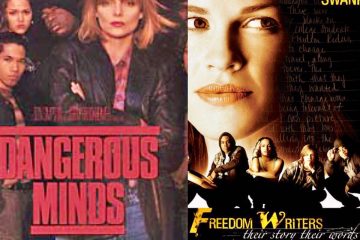The Dangerous Myth of the Super Teacher
With the 2017-18 school year rapidly approaching *reaches forlornly towards the final weeks of summer as a single tear slides down my cheek*, a grotesque fall tradition will soon be upon us: the inevitable fetishization of Super Teachers.
Created by Hollywood and sustained by the internet, the Super Teacher has taken many forms over the years. Initially, they were strictly a thing of the silver screen. When I tell people (especially older people) that I am a teacher in an inner-city school, they are quick to bring up movies like Dangerous Minds or Freedom Writers (nobody ever mentions School of Rock, which is both inspiring and offensive).
South Park parodies the film “Stand and Deliver“.
These very-incredibly-loosely-based-on-a-true-story-movies, and ones like it, often revolve around a teacher going extremely above and beyond, using methods that are unconventional or unbelievable (or some combination of both) – to “save” a group of at-risk youth. It’s not just a good teacher or even a great teacher, it’s a once in a lifetime teacher sent from above to inspire even the surliest of students.
The super teacher movie slowly died off over the last ten years or so, but has recently been brought back to life by videos of real life super teachers going viral seemingly every week of the school year.
We’ve all seen the videos that get passed around of teachers creating secret handshakes with students or rapping the Pythagorean theorem as a way to teach Geometry to 4th graders. As legend has it, these educators can make the best of any circumstance through nothing more than tremendous hard work and willpower.
Maybe I’m just bitter, but the whole idea of the super teacher is horseshit. While it may seem like the simple celebration of someone doing a great thing, it comes at a price. First, it’s important to get it straight that there are no “super” teachers in the same way that there are no “super” mechanics or “super” chemists or “super” anything else. Nobody is perfect at their job. No one can solve every problem.
My grandmother was my preschool teacher, and one of the best teachers I’ve ever had, but even gram had days that didn’t quite hit the mark. This is important to note because educators are constantly being pressured to do less with more, and the myth of the super teacher pushes that to a breaking point. The notion that any teacher can change lives as long as they are willing to put in enough hours is often used as a way to augment arguments that say teachers should have greater access to resources or (god forbid) earn a higher wage.
In an industry that is forever being criticized and deemed as “broken”, the idea that there are people out there that have “figured it out” makes it seem like everyone else is doing something wrong.
People don’t see movies where a scientist makes an incredible discovery and think “Hey! How come other scientists don’t do that? Science would be a lot better if every scientist worked as hard as that scientist!” because most people don’t see science as broken. That same luxury is not afforded to those of us who work in education.
The other, more troubling problem with the super teacher myth is that it often serves as a proxy for the white savior narrative.

I am white and I will save you. A still from the 1995 film “Dangerous Minds”. Courtesy Buena Vista Pictures
For those of you unfamiliar with the white savior narrative, and can’t figure out what it means based on it’s name, take a look at the Wikipedia page for the white savior narrative in film. A huge portion of the movies mentioned in this article fit into the super teacher genre, so much so that there is a whole section dedicated to “inspirational teacher” films on IMDB.
Many of the previously mentioned real life super teachers fit into this same category: a white person here to save the tragic minority youths from their unfortunate plight. This, if you haven’t figured it out yet, is a bad thing. Even if it is a true story, it pushes forward an idea that is hazardous to everyone.
When popular culture tells us that people of color need white people to thrive and escape their fate, it simultaneously inflates the ego and entitlement of white people while oppressing further the very people that they claim to be saving.
This is made worse by the fact that the white savior narrative often insists that the only way for these students to succeed is to “escape” their community, rather than improve it from within. It is, of course, important that we celebrate exceptional educators. Recognizing the work someone does to change the lives of others is a wonderful and important thing. However, it is equally important that we are aware of how we interpret this recognition.









